Medicine

Medicine is a field of training for general practitioners, focusing on skills in examination, diagnosis, treatment and prevention of common diseases in hospitals and the community. medicine for the patient. This is the spearhead discipline of the University, where the teaching staff are leading and experienced medical professionals, doctors and experts.
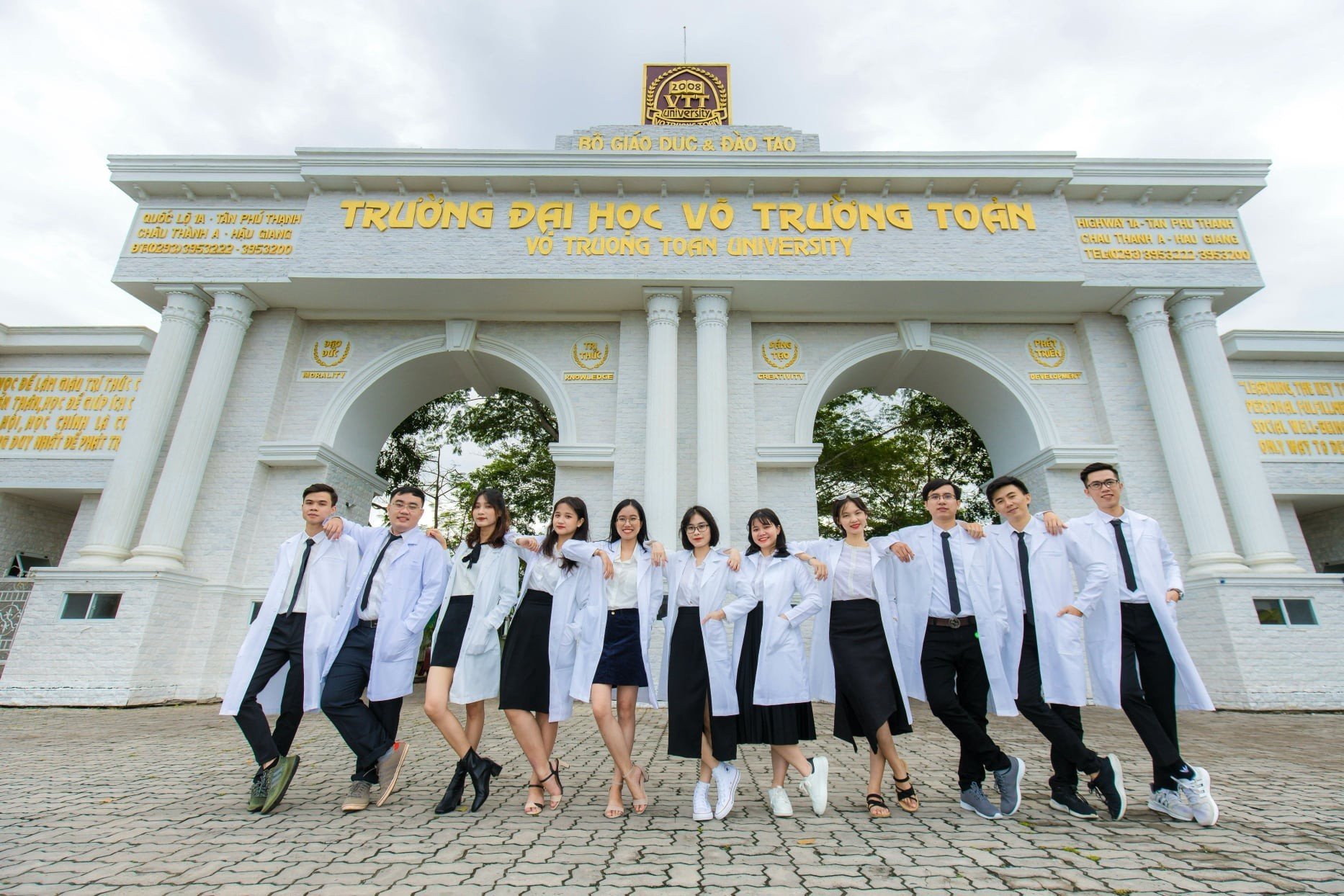
1. People’s Doctor, Associate Professor, Doctor, Doctor TRUONG VAN VIET Vice President of Vo Truong Toan University; Dean of the Faculty of Medicine, Vo Truong Toan University; Former Vice Rector, University of Medicine and Pharmacy, Ho Chi Minh City; Former Director of Cho Ray Hospital. 2. Specialist Doctor II NGUYEN VAN UT Executive Director of University Hospital Vo Truong Toan; Vice Dean of Faculty of Medicine, Vo Truong Toan University; Former Director of Hau Giang Obstetrics and Pediatrics Hospital. 3. Associate Professor, Doctor, Doctor TRAN THI TRUNG CHIEN Department of Public Health, Faculty of Medicine, Vo Truong Toan University; Former member of the Party Central Committee; Former Minister of Health.
4. People’s Doctor, Associate Professor, Doctor, Doctor VO THI NHUNG Department of Obstetrics and Gynecology, Faculty of Medicine, Vo Truong Toan University; Chairman of the Ho Chi Minh City Obstetrics and Gynecology Association; Editor-in-Chief of the Medical Newspaper of Ho Chi Minh City; Former Director of Hung Vuong Hospital in Ho Chi Minh City. 5. Associate Professor, Doctor, Doctor PHAM THI TUAN ANH Department of Surgery, Faculty of Medicine, Vo Truong Toan University; Chairman of the Society of Cardiovascular – Thoracic Surgery Ho Chi Minh City. Ho Chi Minh City; Member of the Editorial Board of the Vietnam Journal of Cardiovascular and Thoracic Surgery; Former Head of Cardiac Surgery Resuscitation Department, Cho Ray Hospital; Former Head of Cardiovascular – Thoracic Surgery Department, University of Medicine and Pharmacy, Ho Chi Minh City. 6. Associate Professor, Doctor, Doctor PHAM NGOC HOA Inter-specialty Department of Surgery, Faculty of Medicine, Vo Truong Toan University; Former Head of Diagnostic Imaging, Cho Ray Hospital; Former Chairman of the Department of Diagnostic Imaging, University of Medicine and Pharmacy, Ho Chi Minh City. Ho Chi Minh City; Former Head of Diagnostic Imaging, Pham Ngoc Thach Medical University.
7. Associate Professor, Doctor, Doctor PHAN THI DANH Department of Basic Medicine, Faculty of Medicine, Vo Truong Toan University; Former Head of Department of Biochemistry, Cho Ray Hospital; Former Medical Director of Cho Ray Hospital in Phnom Penh, Cambodia. 8. Associate Professor, Doctor, Doctor CAO PHI PHONG Department of Internal Medicine, Faculty of Medicine, Vo Truong Toan University; Former Senior Lecturer in Neurology – University of Medicine and Pharmacy, Ho Chi Minh City. 9. Doctor, Doctor LU THI VAN BICH Department of Basic Medicine, Faculty of Medicine, Vo Truong Toan University; Former Head of Microbiology Department, Pham Ngoc Thach Medical University. 10. Doctor, Doctor LUONG DINH LAM Department of Surgery, Faculty of Medicine, Vo Truong Toan University; Former Head of Trauma Department, Cho Ray Hospital. 11. Doctor, Doctor Phong Tan Cuong Department of Surgery, Faculty of Medicine, Vo Truong Toan University; Former Head of Experimental Research Department, Faculty of Basic Medicine, Central Institute of Otolaryngology; Former Deputy Head of Surgery Department, Vietnam – Sweden Children’s Hospital; Former Head of Foreign Affairs, Cho Ray Hospital. 12. Specialist Doctor II HUYNH THI NGOC MAI Department of Obstetrics and Gynecology, Faculty of Medicine, Vo Truong Toan University; Former Deputy Head of Obstetrics and Gynecology Department, Can Tho Central General Hospital.
13. Specialist Doctor II NGUYEN THANH TUNG Department of Public Health, Faculty of Medicine, Vo Truong Toan University; Former Director of Tra Vinh Province Obstetrics and Pediatrics Hospital. 14. Specialist Doctor II NGUYEN VAN NANH Department of Public Health, Faculty of Medicine, Vo Truong Toan University; Former Director of Phong Dien District General Hospital – Can Tho City; Former Director of Cai Rang District General Hospital – Can Tho City; Former Director of the Population and Family Planning Sub-Department of Can Tho City. 15. Specialist Doctor II NGUYEN XUAN KHAI Department of Internal Medicine, Faculty of Medicine, Vo Truong Toan University; Former Director of the Hospital for Psychiatry and Dermatology in Hau Giang Province.
16. Specialist Doctor II TRAN THI LAI Department of Public Health, Faculty of Medicine, Vo Truong Toan University; Former Director of Hau Giang Reproductive Health Care Center; Former Director of the Sub-Department of Population and Family Planning in Hau Giang Province. 17. Specialist II Doctor HO VAN BINH Department of Surgery, Faculty of Medicine, Vo Truong Toan University; Former Director of Chau Thanh General Hospital – Hau Giang. 18. Dr. , Doctor LE DUC THANG Department of Internal Medicine, Faculty of Medicine, Vo Truong Toan University; Former Deputy Director of Thong Nhat Hospital; Former member of the Southern Professional Council – Central Committee for Health Protection.
19. Specialist Doctor II TRAN VAN KET Inter-specialty Department of Surgery, Faculty of Medicine, Vo Truong Toan University; Former Head of Ophthalmology, Can Tho Odonto-Stomatology Hospital; Former Head of Pediatric Ophthalmology Department, Can Tho Odonto-Stomatology Hospital. 20. Specialist Doctor II NGUYEN THANH DAN Department of Public Health, Faculty of Medicine, Vo Truong Toan University; Former Director of Tran Van Thoi District General Hospital; Former Director of Preventive Medicine Center of Ca Mau Province. 21. Specialist II Doctor DANG XUAN LOC Inter-specialty Department of Surgery, Faculty of Medicine, Vo Truong Toan University; Former Chairman of the Department of Odonto-Stomatology, Military Medical Hospital. 22. Specialty Doctor II SALARY Department of Internal Medicine, Faculty of Medicine, Vo Truong Toan University; Former Deputy Director of Military Hospital 121.
23. Specialist Doctor II PHAN THANH TUNG Department of Internal Medicine, Faculty of Medicine, Vo Truong Toan University; Former Deputy Director of Can Tho Central General Hospital; Chairman of the Medical Association of Can Tho City; Along with other lecturers are PhDs, Masters, Specialist Doctors II, Specialist Doctors I with extensive experience in the professional field and medical pedagogy in charge of the subjects according to the training program.
ecturers are PhDs, Masters, Specialist Doctors II, Specialist Doctors I with extensive experience in the professional field and medical pedagogy in charge of the subjects according to the training program.
GENERAL OBJECTIVE
Graduates of medical university training programs are those with health, political qualities and medical ethics; have the ability to apply medical knowledge and skills to solve common health problems in health facilities and in the community safely, effectively, and in accordance with different working conditions together; have the ability to do scientific research and self-study to improve their qualifications and serve the needs of protecting, taking care of and improving people’s health in the context of industrialization and modernization of the country and international integration.
DETAIL GOAL
* Knowledge
– Apply comprehensive theoretical knowledge and solid practical knowledge to identify, propose, and participate in solving common health problems in health facilities and in the community.
* Skill
– Master the basic occupational skills in the practice of medical care in a variety of working conditions in a safe and effective manner.
– Demonstrate communication skills – collaboration – work effectively in the medical environment and social activities.
* Attitude and Abilities
– Forming the capacity for scientific research and self-study.
– Demonstrate the ability to practice medical examination and treatment on the basis of compliance with the provisions of law and standards of medical ethics in the context of industrialization, modernization of the country and international integration.
Time and Education program
Refer to the training program framework: here
The training program has the following highlights and differences:–The program is built according to C.D.I.O (Conceive – Design – Implement – Operate), originated from the American Institute of Technology MIT, is understood as idea formation – idea design – implementation – operation.
–The training program is based on the Medical University Training Program of the Ministry of Education and Training and the General Physician Competency Standards issued by the Ministry of Health of Vietnam No. 1854/QD-BYT issued on 18 May 2015, comparing with the training program of medical universities at home and abroad (Ho Chi Minh City University of Medicine and Pharmacy, Hanoi Medical University, Pham Ngoc Thach Medical University, School of Can Tho University of Medicine and Pharmacy, Harvard University (USA), Stanford University (USA), Australian National Medical University (Australia), University of Sydney (Australia), University of Melbourne (Australia), …)
–In addition to professional knowledge, students are well trained and trained in foreign languages (output standards with IELTS 5.0), specialized English, soft skills, information technology and ethical attitudes. – Developed training program includes: + General education knowledge and basic science: training general knowledge and basic knowledge of the sector. + Professional education knowledge: basic industry knowledge, industry core knowledge, graduation, supplementary and scientific research. – Students can participate in scientific research right from the first year of study (after being equipped with basic medical knowledge), students can practice self-control, self-responsibility and self-development.
–Students can practice clinical with more than 20 hospitals affiliated with Vo Truong Toan University with 3 areas:
+ In Ho Chi Minh City:
- Cho Ray Hospital.
- Hung Vuong Hospital.
- Nguyen Trai Hospital.
- Children’s Hospital Ho Chi Minh City.
- Tu Du Hospital.
- Thong Nhat Hospital.
+ In Can Tho city:
- Can Tho Central General Hospital.
- Can Tho City General Hospital.
- Can Tho City Hospital for Tuberculosis and Lung Diseases.
- Can Tho City Children’s Hospital.
- Can Tho City Obstetrics and Gynecology Hospital.
- Military Hospital 121. Can Tho City Mental Hospital. Can Tho City Cancer Hospital.
- Can Tho Traditional Medicine Hospital.
- Can Tho City Heart Hospital.
- Can Tho City Dermatology Hospital.
+ In Hau Giang province:
- Hau Giang Province General Hospital.
- Nga Bay City General Hospital.
- Vo Truong Toan University Hospital.
- Hau Giang Psychiatric and Dermatology Specialist Hospital.
- Hau Giang Province Obstetrics and Children Hospital.
- Chau Thanh District Medical Center A.
- Nga Bay City Medical Center.
Vo Truong Toan University invests seriously, scale and synchronously in facilities to help medical students have learning experiences from basic theory to practical practice.
The theoretical lecture hall system, where students study subjects in the basic medical knowledge block, is equipped with 100% led screen, modern sound system to meet the audio-visual needs of learners. Each classroom is equipped with air conditioning to help students have the best learning environment.
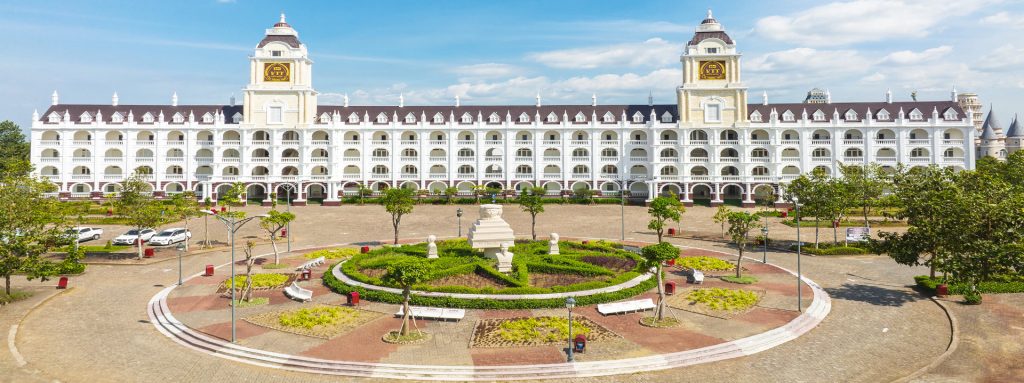
At the Faculty of Medicine – Vo Truong Toan University, the system of laboratories and practices designed specifically for the health sciences sector is scientifically arranged, along with fully equipped equipment, models, Modern practice tools from reputable domestic and foreign sources support students to the maximum in practicing basic medical knowledge and clinical medicine, contributing to creating a specialized practice base. Professional and highly efficient.

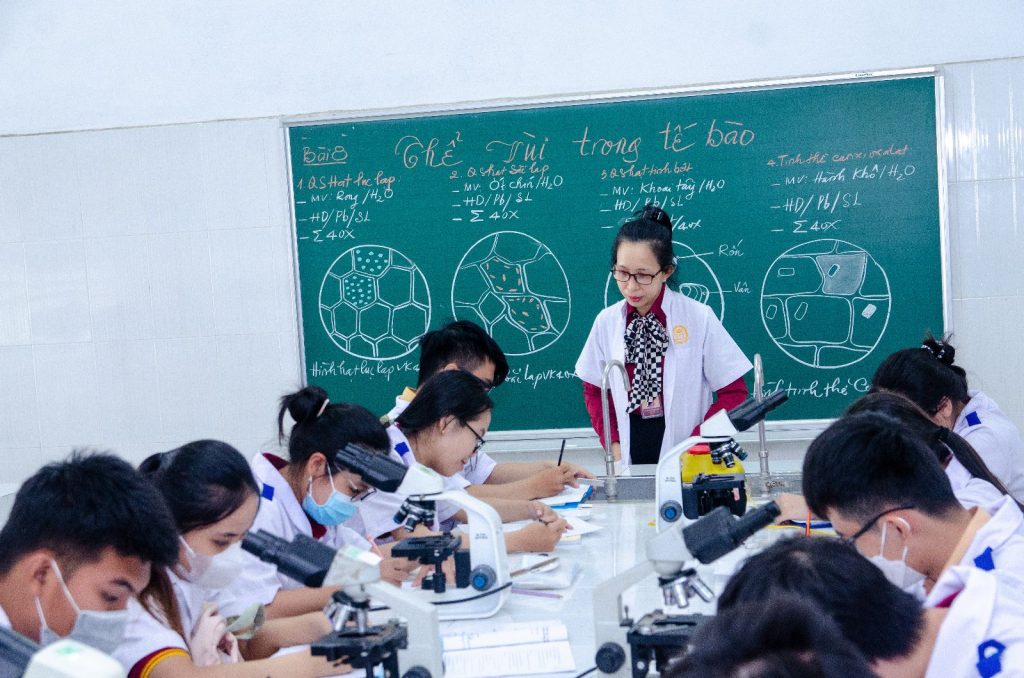
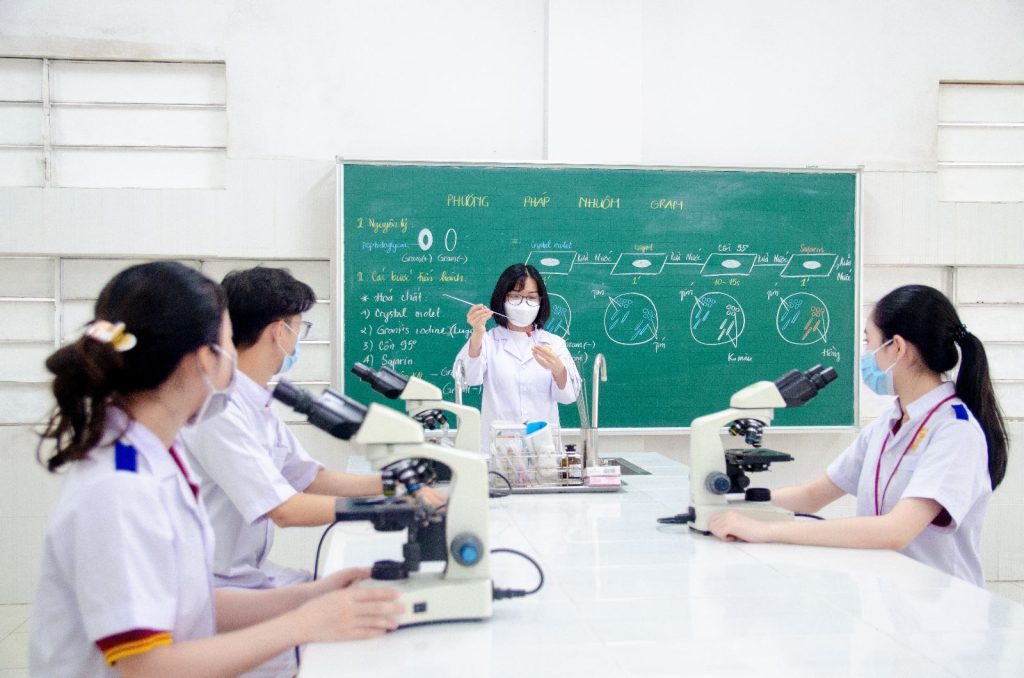
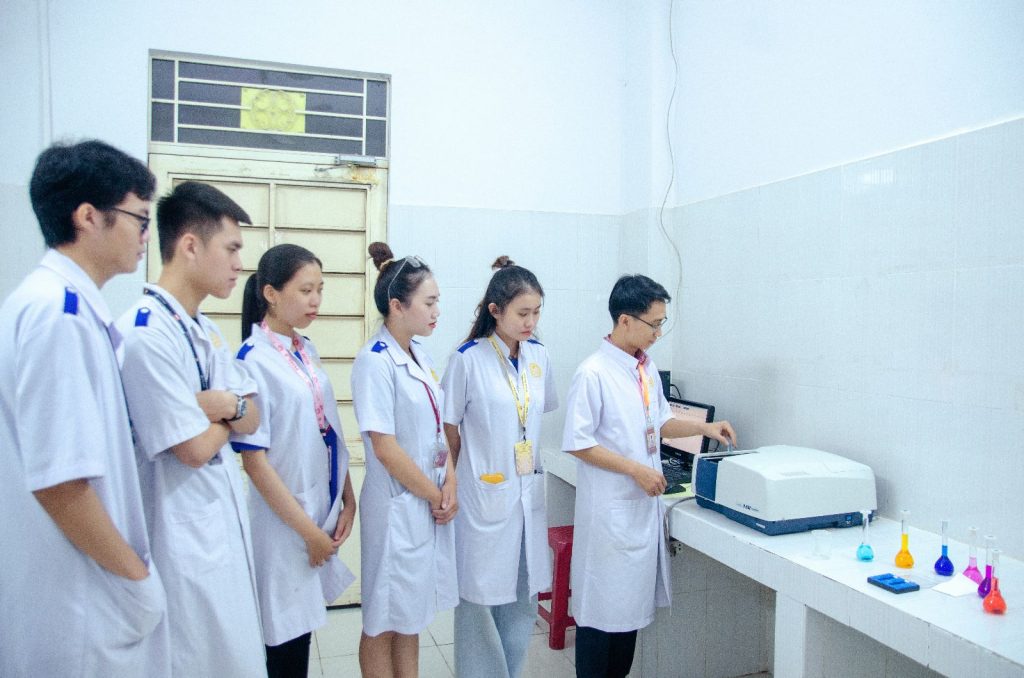
System of practice rooms to meet training courses in Basic Science, Basic Medicine, including: Laboratory of Inorganic Chemistry, Biophysics, Molecular Biomedical and Genetics, Anatomy, Physiology , Biochemistry, Pathophysiology, Immunology, Embryology, Pathology, Microbiology, Parasitology, Nursing.
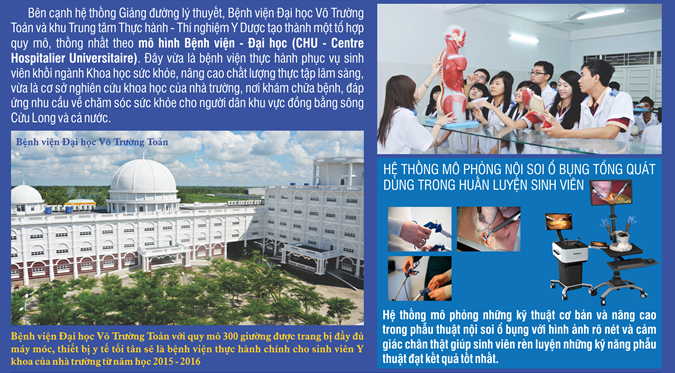
Vo Truong Toan University is also the third institution in the southern region (after the University of Medicine and Pharmacy in Ho Chi Minh City and Can Tho University of Medicine and Pharmacy) to be licensed by the Ministry of Education and Training to train in Medicine. full-time university degree from the 2012-2013 school year.
When it comes into operation, Vo Truong Toan University Hospital will be a clinical practice place for students with clinical specialties.
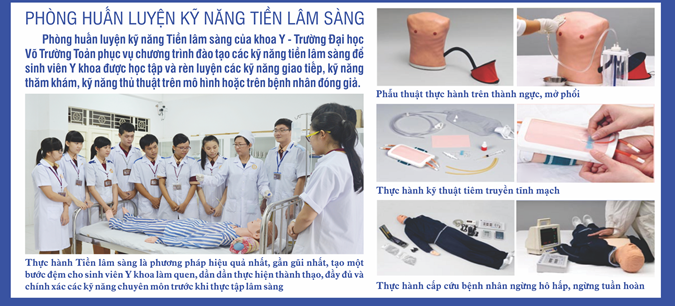
In addition to Vo Truong Toan University Hospital, medical students can practice clinical practice at more than 20 hospitals affiliated with Vo Truong Toan University with 3 areas:
+ In Ho Chi Minh City:
- Cho Ray Hospital.
- Hung Vuong Hospital.
- Nguyen Trai Hospital.
- Children’s Hospital Ho Chi Minh City.
- Tu Du Hospital.
- Thong Nhat Hospital.
+ In Can Tho City:
- Can Tho Central General Hospital.
- Can Tho City General Hospital.
- Can Tho City Hospital for Tuberculosis and Lung Diseases.
- Can Tho City Children’s Hospital.
- Can Tho City Obstetrics and Gynecology Hospital.
- Military Hospital 121.
- Can Tho City Mental Hospital.
- Can Tho City Cancer Hospital.
- Can Tho Traditional Medicine Hospital.
- Can Tho City Heart Hospital.
- Can Tho City Dermatology Hospital.
+ In Hau Giang Province :
- Hau Giang Province General Hospital.
- Nga Bay City General Hospital.
- Vo Truong Toan University Hospital.
- Hau Giang Psychiatric and Dermatology Specialist Hospital.
- Hau Giang Province Obstetrics and Children Hospital.
- Chau Thanh District Medical Center A.
- Nga Bay City Medical Center.
US POSITION
Medicine is a profession with high income and potential for advancement in society. Therefore, there should be the saying “First Medicine, Second Pharmacy”, if you know how to accumulate knowledge, those pursuing the medical profession will not have to worry about job opportunities. Students of Vo Truong Toan University after graduating from medical school can work in many fields such as:
– Doctors are directly involved in treatment and management at public and private hospitals.
– General medical examination and treatment within the prescribed scope of technical classification.
– Assist doctors in medical examination and treatment and perform patient care techniques at medical facilities.
– Participate in first aid for local accidents and disasters.
– Teaching in medical colleges and secondary schools, training managers, teaching assistants in medical and pharmaceutical universities.
– Experts in research institutes in the fields of health science, medicine, biomedicine, medical technology, etc.
– Specialist in health regulatory agencies.
– Specialists in state and non-governmental organizations.
-Working at hospitals from district level to central level.
– Working in medical centers, preventive medicine; guide people to use drugs safely and rationally.
– Participating in the rescue and treatment work, visiting patients in remote areas on volunteering occasions.
– Open your own polyclinic.
– List of units recruiting students of Vo Truong Toan University after graduating from Medicine: Attached files
AVERAGE WAGE
The current salary of a Medical Doctor after graduation will depend on the rank of Doctor and a number of factors such as working position, working experience in the field,… The average salary is from 8 to 8 years old. 15 million VND/month after graduating from college, over time, the salary increases sharply, reaching an average of 25-30 million VND/month.
The right qualities
with Medicine
To pursue a career in Medicine, you need to have or match the following qualities:
1. You have a penchant for natural sciences, especially chemistry and biology.
2. You have honesty, kindness, love for people around you and a sense of ethics in the medical industry.
3. You are honest, careful, precise, detailed, perfectionist and patient at work, not for personal gain.
4. You have good communication skills and quickly adapt to changes and work pressure.
5. You have a quick and standard manner, carry out the work until it is completed.
6. You are willing to study for 06 years and continuously study for life to update new knowledge.
7. You are courageous, not afraid of blood or blood-generating situations that frighten people.
ADMISSION METHODS
Vo Truong Toan University considers medical students in 5 ways:
– Method 1 (enrollment is based on the scores of the national high school or high school graduation exam): Admission for candidates with a total score of 3 subjects for admission is based on the scores of the high school graduation exam (or national high school) belonging to the same combination, plus priority points (if any).
– Method 2 (admission based on high school results/record grades):Have excellent academic performance in grade 12 or have a high school graduation score of 8.0 or higher.
– Method 3 (considering the combination of high school graduation exam results with high school results/record grades): total score of 3 subjects in the same selection, plus priority points (if any). In which, 3 subjects for admission, candidates are allowed to register to choose one (or two) subjects using high school graduation exam scores (or national high school)* combined with the remaining two (or one) subjects using academic results. high school level (record score)** for admission.
-Method 4 (considering the combination of high school graduation exam results with foreign language certificates):total score of 3 subjects in the same selection, plus priority points (if any). In which, candidates can register to choose two subjects using their high school graduation exam scores (or National High School)* combined with foreign language certificate conversion scores for admission.
-Method 5 (direct admission according to the regulations of the enrollment regulations): Comply with current regulations and guidelines of the Ministry of Education and Training.
Note:
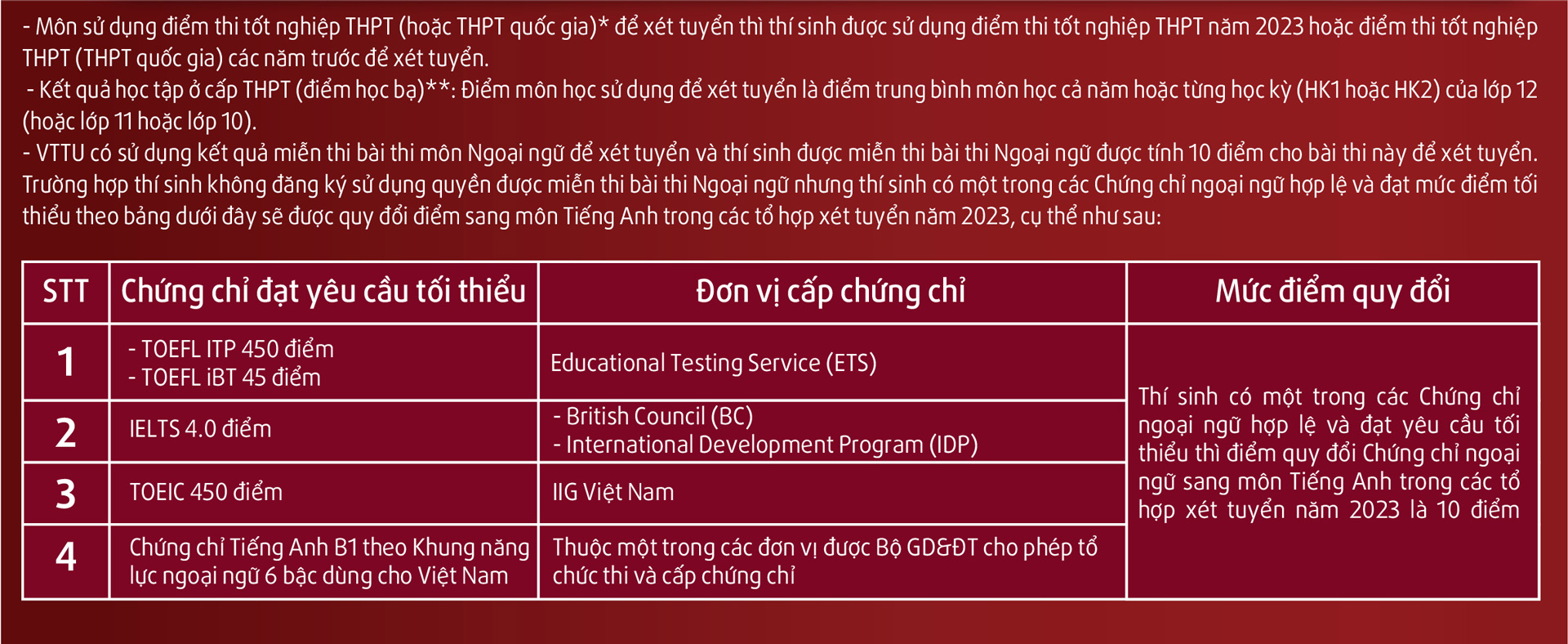
COMBINED RECRUITMENT
Candidates can choose from one of the following combinations:
1. Complex B00 (Math, Biology, Chemistry);
2. Combination A02 (Math, Biology, Physics);
3. Complex B03 (Math, Biology, Literature);
4. D08 combination (Math, Biology, English)
Register for admission to receive scholarships immediately
Students of Vo Truong Toan University must meet the following eligibility criteria:
KNOWLEDGE
– Apply deep and broad theoretical knowledge and solid practical knowledge in basic science, social science, basic medicine, clinical medicine, evidence-based medicine, community health , traditional medicine in the diagnosis, treatment and prevention of common diseases;
– Use knowledge of information technology to meet job requirements (with successful results of the computer output standard exam organized by the University);
– Apply basic knowledge of planning, organization, management, administration and supervision in professional activities.
SKILL
– Competently perform medical skills in diagnosis, treatment and prevention of common diseases.
– Handle common emergencies in accordance with practical conditions, safely and effectively.
– Identify personal and professional development plans in the medical field.
– Participate in consultations and follow consultation decisions within the permitted scope of expertise.
– Demonstrate communication skills, counseling, health education communication to ensure the quality of treatment for patients and disease prevention for the community.
– Able to use at least 01 foreign language in communication and professional activities, satisfying 01 of the following conditions:
+ Have foreign language ability at least level 3/6 of Vietnam’s Foreign Language Competency Framework or equivalent foreign language certificates as prescribed by the Ministry of Education and Training and the School.
+ Having the results of passing the foreign language output standard exam organized by the University.
+ Having achieved results in English courses organized by the University in the training program.
CAPACITY, LEVEL OF AUTHORITYAND RESPONSIBILITY
– Forming the capacity for self-study and scientific research in medicine.
– Practice medicine in accordance with socio-cultural context, actual conditions, professional ethical standards and regulations of law.
– Participate in planning, organizing and implementing comprehensive and reasonable health care for patients.

